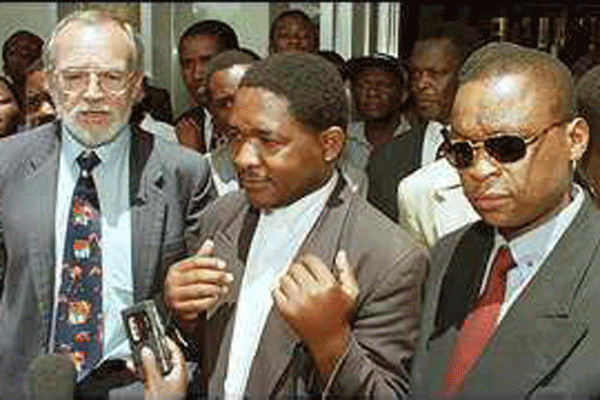
Mark Gova Chavunduka was the founding editor of The Standard newspaper, then known as the The Zimbabwe Standard. He was appointed to edit The Zimbabwe Standard coming from Thomson Publications where he was editor of the country’s largest and most widely-read magazine, Parade. He had a very successful tenure as editor of The Zimbabwe Standard, marked by the historic display of journalistic nerve which saw him endure painful detention and torture along with his chief writer, Ray Choto.
the mark chavunduka column BY SHOLA ADENEKA

In memory of this gallant giant of Zimbabwe’s media fraternity and first editor of this newspaper, The Standard will, in his honour, run for the next 12 months, a weekly opinion column under his name; The Mark Chavunduka Column.
We begin this column by reproducing Chavunduka’s orbituary which was published by a British newspaper, The Guardian on December 3 2002.
As founding editor of Zimbabwe’s independent Sunday newspaper, The Standard, the award-winning journalist and publisher Mark Chavunduka, who has died aged 36, was a champion for media freedom in southern Africa.
His paper became a symbol of resistance among his country’s journalists, and a thorn in the flesh of President Robert Mugabe’s government. He exposed the corruption and political intimidation rife in Zimbabwe, and his outspokenness made The Standard an internationally-recognised voice for those opposed to Mugabe’s tyranny.
Chavunduka entered the limelight in 1999, when The Standard’s chief writer, Ray Choto, reported on widespread Zimbabwean army unrest over the deployment of up to 14 000 troops in the civil war then raging in the Democratic Republic of Congo. Choto claimed that 23 disgruntled soldiers had been detained for inciting mutiny against Mugabe.
For more than 10 days, Chavunduka and Choto were detained incommunicado at Cranborne barracks near Harare. Their lawyer, Simon Bull, said both men were subjected to electric shocks on their genitals, hands and feet by military interrogators, and had their heads submerged in drums of water. They were also blindfolded, stripped naked, made to do push-ups in the rain, and to roll in wet grass to clean the blood from their bodies after beating.
- Chamisa under fire over US$120K donation
- Mavhunga puts DeMbare into Chibuku quarterfinals
- Pension funds bet on Cabora Bassa oilfields
- Councils defy govt fire tender directive
Keep Reading
Independent medical sources confirmed the torture allegations, and the incident, seen by many as the most outrageous attack on press freedom in Zimbabwe since independence, drew worldwide condemnation.
President Mugabe, however, refused to condemn the torture. Instead, he threatened “very stern measures” against the independent press, warned writers not to antagonise the army, and ignored a court order to release the two journalists.
Chavunduka was born into a prominent Zimbabwean family in the capital, Salisbury (now Harare). His father, Dr Dexter Chavunduka, was Zimbabwe’s first black veterinary surgeon, and a member of parliament nominated by Mugabe for his expertise in animal husbandry. As vice chancellor of the University of Zimbabwe, Mark’s uncle, Professor Gordon Chavunduka, a veteran nationalist, had conferred an honorary degree on Mugabe. His aunt, Sarah Kachingwe, was a top civil servant.
Educated at the prestigious St George’s Secondary School [St George’s College], Chavunduka graduated from Harare Polytechnic with a diploma in mass communication and journalism. He began his career as a business reporter, and later news editor, with the Financial Gazette.
In 1991, aged 24, he became the youngest editor of a national publication when he took over the monthly magazine, Parade, whose readership he increased to more than two million. He became editor of The Standard in April 1997, and, under him, the circulation rose from 12 000 to 37 000. After his release, he was treated for post-traumatic stress disorder at the London-based Medical Foundation for the Treatment of Torture Victims.
Two years ago, Chavunduka won a Nieman fellowship at Harvard University, but, last year, returned home. “My family all said I should have stayed in the US, but I am so angry about the way we were treated,” he said, “and I won’t give the government the satisfaction of knowing I’ve run away”. Last April, he resigned as editor of The Standard after taking over the majority shareholding in the local Thomson Publications (Pvt).
The cause of the illness that led to his death was not announced. He is survived by his wife, two daughters and a son. — The Guardian
Mark Gova Chavunduka, journalist and publisher, born November 28 1965; died November 11 2002.











